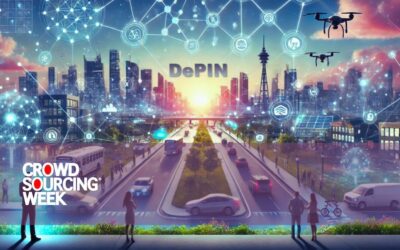Can crowdsourcing and collaboration offer new solutions where older, traditional ways of doing business have failed to deliver? The answer is a resounding ‘yes’. As digital technology has grown, so too has the number of tools that can be used for collaboration and business development.
Encouragingly, this growth has carried over to organizations with social goals. A recent study by the innovation charity Nesta has identified nearly 1,000 organizations (and nearly 700 collaborative projects) working in the field of digital social innovation across Europe. And it is likely that the real figures are significantly higher, as many grassroots innovators are yet to find their way onto the database. The speed of these developments would have been unimaginable only a few years ago.
Why crowdsourcing?
Crowdsourcing conferences that bring together developers, entrepreneurs, investors and policymakers are also fast emerging. Crowdsourcing Week (CSW), a Singapore/New York-based operation, is the world’s largest platform for the global crowdsourcing community. Its mission is to make the technical know-how of the new crowd economy (which includes crowdfunding, collaborative consumption, sharing economy and open innovation) accessible to all – corporates, governments, non-profits and entrepreneurs.
Crowdsourcing Week provides compelling examples of how global problems can be addressed with local solutions, or ‘glocalism’. Apply this logic to other international challenges – such as climate change, conflict, social integration, economic inequality, health problems or disease epidemics – and you see how, with the right partnerships, cities and neighborhoods can provide alternatives to the traditional channels of global governance.
Crowdsourcing week Arctic Circle – Luleå – Vuollerim – Austin – Malmö….
This March, Crowdsourcing Week will travel to the Arctic Circle. Across a three-day summit in Luleå and Vuollerim, Swedish Lapland, the workshops, talks and case studies will focus on using innovation for the common good. The program marks a bold new step for the network economy, where local and global neighborhoods collaborate to create jobs and new opportunities.
The ability of cities and smaller municipalities to shape national strategies should not be underestimated. Both Luleå (the capital of Norrbotten County) and Vuollerim (a small village in Jokkmokk Municipality) have been recognized as leaders on a national level.
Challenges in Vuollerim, for instance, can being solved through dialogue with a partner village in north Italy, as well as though the Forum for Social Innovation in the Swedish city of Malmö. Challenges in Luleå, meanwhile, can been solved through dialogue with Austin, Texas. The two cities have had collaboration agreement since 2015.
Once deeply rooted in iron and steel, Luleå is now home to a cluster of world-leading, climate-neutral data centers used by tech giants including Facebook. Greenpeace publicly welcomed Facebook’s investment here because of the Swedish operation’s continued use of renewable energy.
New technology and business development
This success is one of many ways in which Luleå has emerged into our new economic era. River hydropower is now a significant resource, and even the city’s traditionally ‘dirty’ industries are cleaning up. Steel facilities now contribute their surplus energy to the district heating system, keeping neighbourhoods warm at prices lower than those found anywhere else in the country. These developments are accompanied by Luleå’s vibrant music scene (a viable selling point for the city) which sees concerts held in igloos and musical instruments made of ice.
When Luleå’s Deputy Mayor, Niklas Nordström, entered his counterpart’s office in Austin with a collaboration agreement, he showed that a new global landscape is evolving. It’s moving fast. But then so is Austin. The Texan capital is now an emerging center of IT and innovation, home to some of America’s most vibrant creative sectors. The city’s governor has even appointed a senior official whose sole function is to ensure that the city remains a leading hub for the country’s music industry.
When we asked Nordström about his views on the city’s role and global focus, he explained that to do nothing would be irresponsible and will lead to stagnation and unsustainable community development. His message applies to players much smaller than the city he represents.
Vuollerim – 800 inhabitants – 40 NGO:s and 60 SME:s…
Drive 90 minutes north-west of Luleå and you’ll reach Vuollerim, the Swedish hinterland’s best-kept secret. It isn’t only the famous Northern Lights that have lit up this remote community’s development (and enticed Crowdsourcing Week to host the final day of its summit here). In fact, news of this tiny village’s achievements has reached business developers, universities and investors the world over. The innovations that have emerged (and the businesses that have chosen to set up here) show the brave new world in which we now live – one where the Internet of Things touches the most rural of areas.
How can the social model being developed in Vuollerim – a community that has inspired both locals and global social developers – also inspire today’s decision-makers.
In 2015 we met the founder of Crowdsourcing Week, Epi Ludvik Nekaj on a visit to Vuollerim. The Singaporean’s feelings about what drives progress here were unambiguous. What’s more, his eyes lit up when the conversation turned to the multifaceted nature of Vuollerim’s development. Around 40 non-profit organizations and 60 companies have set up shop in this tiny village of just 800 inhabitants.
His enthusiasm will be shared by anyone who visits Luleå and Vuollerim this March. The summit offers all involved a chance to explore the toolbox of collaboration, and to be inspired by the cities and rural areas embracing new technologies. New speakers are signing up every week, and the program already include talks from Epi Ludvik Nekaj and Kevin Jones, co-founder of leading social capital network, SOCAP. Attendees will also get to meet people working on new green energy solutions, gain insights in crowdfunding platforms, and hear success stories, such as the electric car startup, Uniti Sweden, which exceeded their equity crowdfunding target within 36 hours.
Bert-ola Bergstrand and Kaj Embrén
Follow the details on program and speakers at https://crowdsourcingweek.com – the place where you also fill in your registration to secure a seat.
You can also follow us on Twitter:
Bert-Ola Bergstrand – @ContChange
Kaj Embrén – @KajEmbren



0 Comments